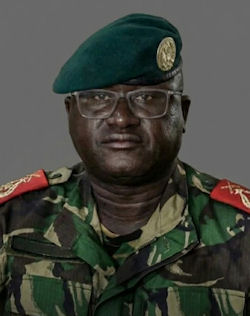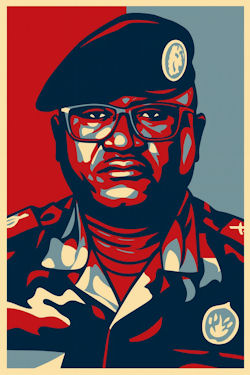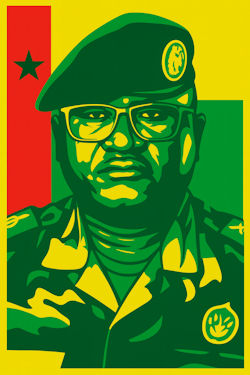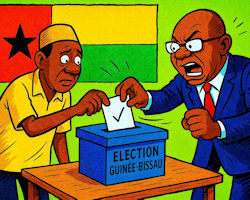Guinea-Bissau - Politics 2025
 On 26 November 2025, military officers in Guinea-Bissau announced they had seized total control of the country in a coup d'état, deposing President Umaro Sissoco Embalo and abruptly suspending the nation's electoral process. The takeover unfolded amidst a deeply contested presidential vote held just days earlier, on 23 November. The situation escalated when sustained gunfire erupted in the capital, Bissau, near key government installations including the presidential palace, the election commission, and the Interior Ministry, signaling the military's move against the civilian government.
On 26 November 2025, military officers in Guinea-Bissau announced they had seized total control of the country in a coup d'état, deposing President Umaro Sissoco Embalo and abruptly suspending the nation's electoral process. The takeover unfolded amidst a deeply contested presidential vote held just days earlier, on 23 November. The situation escalated when sustained gunfire erupted in the capital, Bissau, near key government installations including the presidential palace, the election commission, and the Interior Ministry, signaling the military's move against the civilian government.
The coup was formally declared by a group calling itself the "High Military Command for the Restoration of Order." The announcement was made on state television by General Denis N'Canha, the former head of the presidential military office, who positioned himself as the leader of the new military command. In his address, General N'Canha justified the military's actions as a necessary response to what he described as an ongoing plot by politicians and what he termed "national drug lords" to destabilize the country by manipulating the results of the electoral process. Following the announcement, the military junta took immediate and decisive measures to consolidate its power, including closing all land, air, and sea borders, imposing an indefinite overnight curfew, and suspending all media programming.
The political context for this military intervention was one of intense instability and a disputed democratic process. The coup occurred just one day before the official results of the 23 November presidential election were scheduled to be announced. The pre-emptive declarations of victory by both incumbent President Umaro Sissoco Embalo and his main challenger, Fernando Dias, had created a volatile political stalemate. Furthermore, the credibility of the electoral process had been severely questioned after the country's Supreme Court barred the main opposition party, the PAIGC, from contesting the presidential election. This was not an isolated event in Guinea-Bissau's history but rather the ninth successful coup or attempted coup since the nation gained independence from Portugal in 1974. President Embalo's own tenure had been marked by similar instability, including his dissolution of the legislature in December 2023, which led him to rule by decree, and his claims of having survived several attempted coups, including one as recently as late October 2025.
In the aftermath of the takeover, several high-profile figures were arrested. Alongside President Embalo, those detained included the armed forces chief of staff, his deputy, the interior minister, opposition candidate Fernando Dias, and PAIGC leader Domingos Simoes Pereira. The international community responded with swift concern. The United Nations Secretary-General expressed deep alarm and appealed for restraint and respect for the rule of law. Portugal, the former colonial power, urged all parties to refrain from violence and to work towards restoring institutional functionality to allow for the completion of the electoral process. The events of 26 November 2025 thus represent another severe disruption to Guinea-Bissau's fragile democratic order, underscoring the persistent challenges of military involvement in politics and the difficulty of establishing stable governance in the country.
Denis N'Canha
 On 26 November 2025, General Denis N'Canha emerged as the public face and leader of the military takeover in Guinea-Bissau. He is identified in reports as the head of the military household at the presidential palace and was the head of the presidential guard, a position tasked with the protection of the president. In a statement read on state television while surrounded by armed soldiers, he announced that the military had taken "total control" of the country.
On 26 November 2025, General Denis N'Canha emerged as the public face and leader of the military takeover in Guinea-Bissau. He is identified in reports as the head of the military household at the presidential palace and was the head of the presidential guard, a position tasked with the protection of the president. In a statement read on state television while surrounded by armed soldiers, he announced that the military had taken "total control" of the country.
General N'Canha [His name is also sometimes spelled “Dinis Incanha” or “Dinis N’Tchama”.] declared the formation of the "High Military Command for the Restoration of Order," a body composed of all branches of the armed forces that would lead the nation until further notice. He stated that the coup was launched in response to "the discovery of an ongoing plan" orchestrated by politicians and other figures, including a "well-known drug lord," which aimed to destabilize the country by manipulating the results of the presidential election held on 23 November 2025.
Following the seizure of power, General N'Canha announced a series of decisive measures on behalf of the new military command. He declared the deposition of President Umaro Sissoco Embaló and ordered the immediate suspension of the entire electoral process, which was awaiting official results. He also announced the closure of all land, air, and sea borders, the suspension of all media programming, and the imposition of an indefinite overnight curfew. In his address, he urged the citizens of Guinea-Bissau to remain calm during the transition.
A significant aspect of this event is General N'Canha's previous role in close proximity to the ousted president. As the head of the presidential guard, he was the official responsible for President Embaló's security. Al Jazeera's reporting highlighted the irony of the situation, noting that "the man supposed to protect the president himself has put the president under arrest". President Embaló confirmed his own arrest and deposition in a phone call to France24.
Denis N’Canha is a senior military officer in Revolutionary Armed Forces of the People (the national armed forces of Guinea-Bissau). In February 2021, he was appointed as head of the “Military Office of the Presidency” — in Portuguese, Chefe da Casa Militar da Presidência — replacing his predecessor, General António Abel. At that time, he held the rank of Colonel; subsequently, he was promoted to Brigadier General. From this position, N’Canha was closely integrated into the seat of power, serving as the link between the presidency and the military apparatus. His role presumably gave him oversight and influence over the security of the presidency — a sensitive, high-stakes function in a country long plagued by instability.
Detailed personal information about General Denis N'Canha — such as his full biography, career history, and background — remained largely unavailable in public reports. Much remained unclear: there was no publicly available detailed biography of N’Canha — his age, place of birth, early career, education, family background — are not widely documented. The exact composition of the new military command, its roadmap (if any) to restore civilian government, and how other power centers (civil society, opposition groups, international actors) will react are all uncertain.
The ascent of Denis N’Canha to the helm of power in Guinea-Bissau is deeply consequential. First, it underscores the fragile relationship between civilian politics and the military in a country that has experienced repeated coups since independence from Portugal in 1974. Second, N’Canha’s takeover — only days after contested elections and amidst claims, counterclaims, and alleged plots — threatens to entrench a new period of military rule. The suspension of institutions, freeze on media and elections, and imposition of curfews could mark a regression in democratic governance, civil liberties, and rule-of-law norms.
Third, the method and timing of the coup may fuel deeper instability. Because neither opposition groups nor foreign governments have recognized the legitimacy of the takeover yet, there is a risk of internal unrest, external pressure, or fractured governance — especially in a country where the army has historically played a decisive role in politics. Finally, with N’Canha now positioned as the de facto leader of Guinea-Bissau, the future of the country will depend heavily on the choices he and the new military command make — whether to restore civilian rule, negotiate with opposition forces, hold credible elections, or entrench military governance. The ripple effects — domestically and regionally — could be significant.


Scenario 1 — Consolidation of Military Rule
The most likely short-term trajectory (0–24 months). In this scenario, N’Canha and the High Military Command decide that the “restoration of order” mandate is open-ended. The suspension of political institutions, media, borders, and the electoral process becomes the new normal. Though the military initially frames the takeover as a corrective action against alleged electoral manipulation and national instability, it gradually settles into a pattern of governing through decrees, bypassing all civilian checks and balances.
Over time, the junta reorganizes the security structures around N’Canha personally. Key loyal commanders are promoted, dissenting officers quietly purged, and new internal intelligence units are created under the justification of national security. The curfew might be relaxed, but only symbolically, while real political power remains firmly in military hands.
International reactions — condemnations, sanctions threats, suspension from regional bodies like ECOWAS — create diplomatic pressure, but not enough to force an immediate reversal. Instead, Guinea-Bissau drifts toward the model seen in Mali and Burkina Faso: the junta adopts a defensive posture, presenting itself as the only actor capable of stabilizing the nation in the face of foreign interference, political corruption, and organized crime.
Under this pathway, N’Canha gradually evolves from a transitional military figure into a long-term strongman, centralizing authority in a system that increasingly resembles military-bureaucratic autocracy.
Scenario 2 — Negotiated Transition With Civilians
Moderately likely, but dependent on internal and external pressure - In this scenario, the junta discovers that it cannot govern the country indefinitely without paying an economic and political price. International isolation begins to bite: frozen aid flows, suspended development programs, travel restrictions on senior officers, and growing tension with neighboring Senegal and Guinea create a strategic dilemma. Domestically, civil society groups — lawyers’ associations, clergy networks, student organizations, women’s cooperatives — begin to push for clarity on a road map back to constitutional order.
Under increasing pressure, N’Canha opts for a controlled, negotiated transition. He announces a timetable for constitutional reform, the reopening of political space, and eventual multiparty elections. A transitional charter is drafted. Civilian technocrats may be invited to join an interim cabinet, though the military retains final authority.
This kind of transition is rarely linear: there may be pauses, reversals, and attempts by the junta to influence the rules of the game. But the key difference from Scenario 1 is that the military accepts the principle — and in time, the reality — of stepping back. Such a transition typically takes between 18 months and 3 years, depending on internal stability and the ability of civilian groups to negotiate in a unified way. The end result: Guinea-Bissau returns to a constitutional government, but with the armed forces still holding informal power behind the scenes.
Scenario 3 — Internal Fracture and Instability
Less likely immediately, but possible if the coalition behind N’Canha splinters = This scenario is more dangerous and unpredictable. Guinea-Bissau’s military has long been factionalized, with competing networks tied to political patrons, business interests, ethnic loyalties, and, historically, to elements of the transatlantic drug trade. If N’Canha is unable to balance these factions — or if his crackdown on political and media institutions alienates key officers — the junta could fracture from within.
A rival commander might challenge the High Military Command’s legitimacy, or sympathetic units could attempt a counter-coup claiming that N’Canha exceeded his mandate. Civilian protests, if they grow large enough, could trigger repression that further weakens military cohesion. External actors might also play a role: neighboring governments, regional blocs, or even illicit networks could take sides in a struggle for influence.
In this scenario, the country enters a period of stop-start instability, with repeated attempted coups, contested authority, and a weakened state apparatus. N’Canha may remain a dominant figure, but his control becomes tenuous, and the security situation deteriorates. This is the scenario with the highest risk to civilians and the lowest probability of orderly governance.
In Guinea-Bissau, 12 candidates were vying for the presidency on 23 November 2025, with incumbent Umaro Sissoco Embalo seeking a second term. However, the election has been marred by controversy following a Supreme Court ruling barring his main rival, Domingos Simoes Pereira of the African Party for the Independence of Guinea and Cape Verde, from running. The democracy of 29 years ago was no longer the model the country was experiencing, but rather model defined by a single person.
The poll was originally set for 2024 but was postponed by Embalo. It was the first time the PAIGC, the historic party that led the armed struggle for national liberation in 1973 will not be on the ballot. In an unprecedented move, the coalition led by the African Party for the Independence of Guinea and Cape Verde (PAIGC) had been excluded from the presidential and legislative elections. The country’s supreme court ruled that the PAIGC and its candidate Domingos Simões Pereira had submitted their nomination too late.
The President is elected through majority vote to a renewable 5-year term. The President may not run for a third consecutive term and must wait 5 years after the second term before running for a third. The Prime Minister is appointed by the President with the consultation of the People’s National Assembly. All 102 members of the People’s National Assembly are elected through list proportional representation to a 4-year term.
Several senior military officers were arrested on 03 November 2025 on accusations of trying to stage a coup. The army said it had thwarted an “attempt to subvert the constitutional order.” “This sad episode, which involves some general and senior officers of our Armed Forces, jeopardises the peace and stability so desired for socio-economic development and the attraction of foreign investment,” the armed forces General Staff said in a statement. Guinea-Bissau had gone through four coup and 17 coup attempts since 1974.
As the West African nation prepared to hold parliamentary and presidential polls, the disqualification of major opposition figures left incumbent President Umaro Sissoco Embalo in a strong position. President Umaro Sissoco Embalo, first elected in 2019, was running for a second term despite initially pledging to serve only one. Sissoco Embalo sought to remind voters how much he had done for the country: "I have given my all to give Guinea-Bissau a second chance at the future. Do you really want to hand the country over to someone who has no vision for the future?" he asked.
 Sissoco Embalo has curated an international reputation over the past five years. He is said to have made more than 300 trips abroad, including 200 flights on a private jet for non-state visits, says Fransual Dias from the opposition party PRS. Pedro Jandim, a representative of Domingos Simoes Pereira's PAIGC party in Germany, told DW: "We have a president who doesn't care about the problems in his own country because he is constantly abroad. Our schools don't work, our hospitals don't work. Roads are not being built. Nothing works in Guinea-Bissau."
Sissoco Embalo has curated an international reputation over the past five years. He is said to have made more than 300 trips abroad, including 200 flights on a private jet for non-state visits, says Fransual Dias from the opposition party PRS. Pedro Jandim, a representative of Domingos Simoes Pereira's PAIGC party in Germany, told DW: "We have a president who doesn't care about the problems in his own country because he is constantly abroad. Our schools don't work, our hospitals don't work. Roads are not being built. Nothing works in Guinea-Bissau."
In 2023, he dissolved the opposition-controlled parliament after armed clashes which he described as an attempted coup. But critics saw this move as an effort to extend his mandate. "Although Embalo's official term ended in February 2025, he remained in office and spent the following months systematically sidelining the opposition," the journalist Bacar Camara told DW. Umaro Sissoco Embalo's five-year term as president officially expired on February 28, 2025. Technically, he is no longer Guinea-Bissau's leader, but he has not stepped down. Embalo has ruled the West African country by decree for over a year,and seems intent on stopping Domingos Simoes Pereira, who is accused of corruption, from ever being appointed prime minister.
Domingos Simoes Pereira, leader of the African Party for the Independence of Guinea and Cape Verde (PAIGC), insists Embalo must step down immediately. Pereira is a former prime minister and President Embaló’s foremost rival. Pereira leads a coalition that actually won the last parliamentary elections in 2023 with an absolute majority. But since then, Embalo has systematically prevented Pereira from forming a government.
The four-year term of the parliament had also expired, so Pereira wanted new presidential and parliamentary elections "within 90 days and not only on November 30, as the president has suggested." Pereira adds: "The constitution requires this. Before that, the parliament, which the president dissolved in December 2023, must be urgently reconvened." According to Pereira, this parliament must appoint the members of the National Election Commission and elect the president of the Constitutional Court, whose mandates have also expired. Most other political parties in the country, legal experts, and civil society representatives in Guinea-Bissau share this view.
It seems Embalo intends to remain president for the foreseeable future, and stop other political entities other than himself and his hand-picked cabinet from having any decision-making power. Embalo, a former brigadier general, served as Guinea-Bissau's prime minister between 2016 and 2018. Originally a member of the PAIGC, he joined the MADEM G15 group, a breakaway faction.
"The political situation in the country is very tense. The streets of Bissau are filled with soldiers, and the population is in panic and afraid of what might happen in the near future," says Bubacar Turé, the chairman of Guinea-Bissau's Human Rights League. For now, there are no large demonstrations. The visible presence of security forces and the start of Ramadan - which affects over half of Guinea Bissau's population - has discouraged protests, according to Ture.
Larger protests have so far been limited to the Bissau-Guinean expatriate communities, for instance in Portugal's capital, Lisbon. Demonstrators in downtown Lisbon shouted: "Sissoco, out! Sissoco, out! Long live democracy!" One protester told DW: "We demand respect for the constitution in our homeland, the Republic of Guinea-Bissau. The mandate of Umaro Sissoco Embalo has ended. We are here to demand respect for the law."
While the opposition was in uproar, there was increasing apathy from citizens buckling under a severe economic crisis. Nuno Nabiam, a former prime minister and leader of the second-largest opposition party, API, tells DW protest action is inevitable until constitutional order is restored. But Umaro Sissoco Embalo dismissed the opposition as "incompetent", before paying a friendly visit to Vladimir Putin in Moscow. At home, Interior Minister Botche Cande - one of Embalo's closest allies - threatened to "nip any demonstration in the bud." The Secretary of State for Public Order, Jose Carlos Macedo Monteiro, said security forces would not tolerate any action aimed at "disturbing public order in the country."
Of the 14 parties competing for 102 parliamentary seats, only the pro-government platform No Kumpu Guine (Together for Guinea-Bissau) appears to have a realistic chance at winning a majority. For the first time in the country's history, the African Party for the Independence of Guinea and Cape Verde (PAIGC), which led Guinea-Bissau to independence from Portugal in 1974, will not appear on the ballot.
The PAIGC-led coalition Pai Terra Ranka (Forward with Our Homeland), headed by Embalo's main rival Domingos Simoes Pereira, was disqualified by the Supreme Court in October. Officially, the reason was the late submission of election documents, though many observers view it as politically motivated. The only well-known alternative is independent candidate Fernando Dias, whose support stems in part from the PAIGC. Other candidates, such as Jose Mario Vaz and Baciro Dja, remain largely marginal.
Camara said the regime has used the judiciary to eliminate political opponents. "The two main opposition coalitions were simply disqualified on legal grounds that lack any credible basis," he said. He described the move as a "domino effect" seen in other African countries — a strategy to systematically weaken the opposition and consolidate power.
Lucia Bird, an expert at the Global Initiative against Transnational Organized Crime, told the AFP news agency that Embalo is in a "strong position." "This is partly explained by the fact that he was able to conduct his campaign without restrictions, unlike the remaining opposition, which faced significant limitations," such as a lack of resources, she said.
Guery Gomes Lopes, spokesperson for the Guinean Human Rights League, criticized the lack of engagement from international organizations. Neither the West African trade bloc ECOWAS, nor the African Union, the European Union,or the United States have shown significant interest. "This is the first time that there is no international oversight of the elections. We don't know if the international organizations have not been invited or if they are not interested," Lopes told DW, adding that "we don't know what is going on with the international partners, like the European Union. This is not a free, just and transparent electoral process."
It is unclear which international observers had been invited, and domestic law does not allow local monitors. Some civil society groups plan to oversee the elections, but they have limited capacity. Independent media coverage was also restricted. Public Portuguese broadcasters RTP Africa and RDP Africa, as well as the news agency LUSA, were expelled from Guinea-Bissau in August. Bascar Camara told DW that while airtime is legally regulated, coverage is heavily skewed in favor of the government, leaving opposition voices marginalized.
|
NEWSLETTER
|
| Join the GlobalSecurity.org mailing list |
|
|
|

